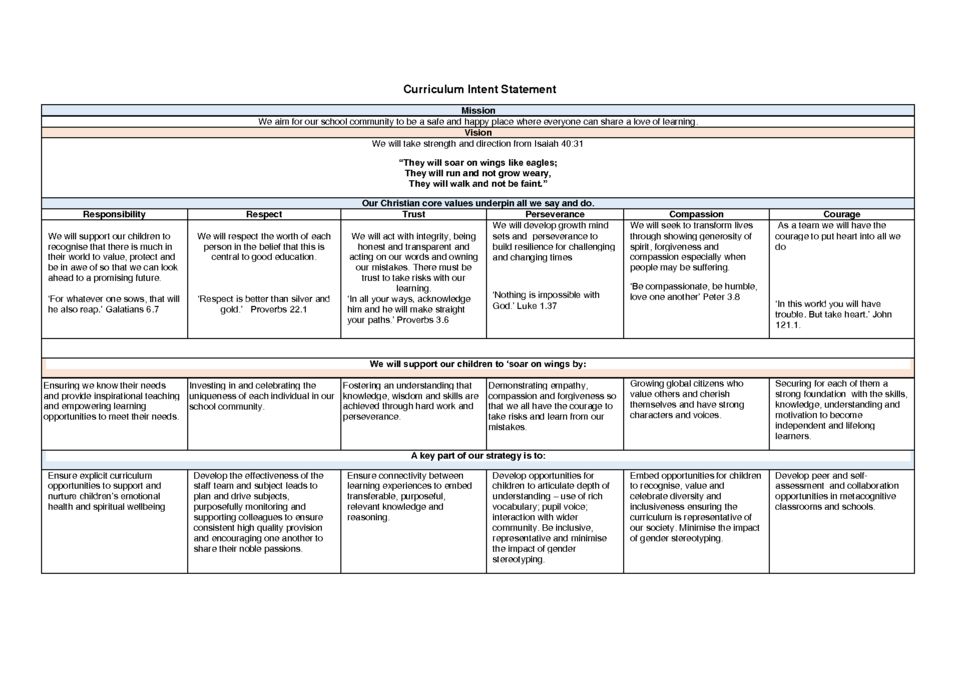Proverbs 22.6
Train a child on the way they should go
and when they are old, they shall not
depart from it.
Long Term Plans
Red Skippers - EYFS and Year One
2024-25
EYFS and Y1 Long Term Plan 2023 To 2025
Cross Curricular Overview Summer 2025
Cross Curricular Overview January 2025
Cross Curricular Overview September 2024
2023-24
Cross Curricular Overview April 2024
Cross Curricular Overview January 2024
Cross Curricular Overview Autumn 2023
2022-23
Cross Curricular Overview Summer 2023
Cross Curricular Overview Spring 2023
Cross Curricular Overview Autumn 2022
Cross Curricular Overview Summer 2022
Cross Curricular Overview Spring 2022
Cross-Curricular Overview January 2022
Cross-Curricular Overview September 2021
Cross-Curricular Overview Summer 2021
Cross-Curricular Overview January 2021
Cross-Curricular Overview Autumn 2020
Cross-Curricular Overview Summer 2020
Cross-Curricular Overview Spring 2020
Cross-Curricular Overview Autumn 2019
Cross-Curricular Overview Summer 2019
Cross-Curricular Overview Spring 2019
Cross-Curricular Overview Autumn 2018
Gatekeepers - Year 2 and 3
Year 2 And Year 3 Long Term Plan 2023 To 2025
2024-25
Cross Curricular Overview Summer Term 2025
Cross Curricular Overview Spring 2025
Cross Curricular Overview Autumn 2024 Remarkable Romans
2023-24
Cross Curricular Overview Summer 2024
Cross Curricular Overview Spring 2024
Cross Curricular Overview Autumn 2023
2022-23
Cross Curricular Overview Summer Term 2023
Gatekeepers Long term plan from September 2021
Cross Curricular Overview Spring 2023
Cross Curricular Overview Autumn 2022
Cross Curricular Overview Summer 2022
Cross Curricular Overview Spring 2022
Cross Curricular Overview Autumn 2021
Curriculum Parent Plan Summer Term 2021
Curriculum Plan Spring Term 2021
Curriculum Plan Autumn Term 2020
Peacocks - Years 4, 5 and 6
Years 4-6 Long Term Plan 2023-2026
2024-25
Cross Curricular Overview Summer 2025
Cross Curricular Overview Spring 2025
Cross Curricular Overview Autumn 2024
Cross Curricular Overview Summer 2024
Cross Curricular Overview Spring 2024
Cross Curricular Overview Autumn 2023
Cross Curricular Overview Summer 2023
Cross Curricular Overview Spring 2023
Cross Curricular Overview Autumn 2022
Cross Curricular Overview Summer 2022
Cross Curricular Overview Spring 2022
Cross Curricular Overview Autumn 2021
Cross-curricular Overview Summer 2021
Cross-curricular Overview Spring 2021
Cross-curricular Overview Autumn 2020
Cross-Curricular Overview Summer 2020
Cross-Curricular Overview Spring 2020
Cross-Curricular Overview Autumn 2019
Cross-Curricular Overview Summer 2019
Cross-Curricular Overview Spring 2019
Cross-Curricular Overview Autumn 2018
Useful information
2024 Parent Information Optional Tests KS1
Curriculum Overview for Years 1-6
The new national curriculum in English Primary schools – A guide for parents
Information for parents: 2018 national curriculum tests at the end of key stages 1 and 2
There is lots of useful help and advice regarding the school curriculum here but please contact Helen Clarke in the school office on 01692 630241 or office@neatishead.norfolk.sch.uk if you have any enquires regarding the school’s curriculum.








